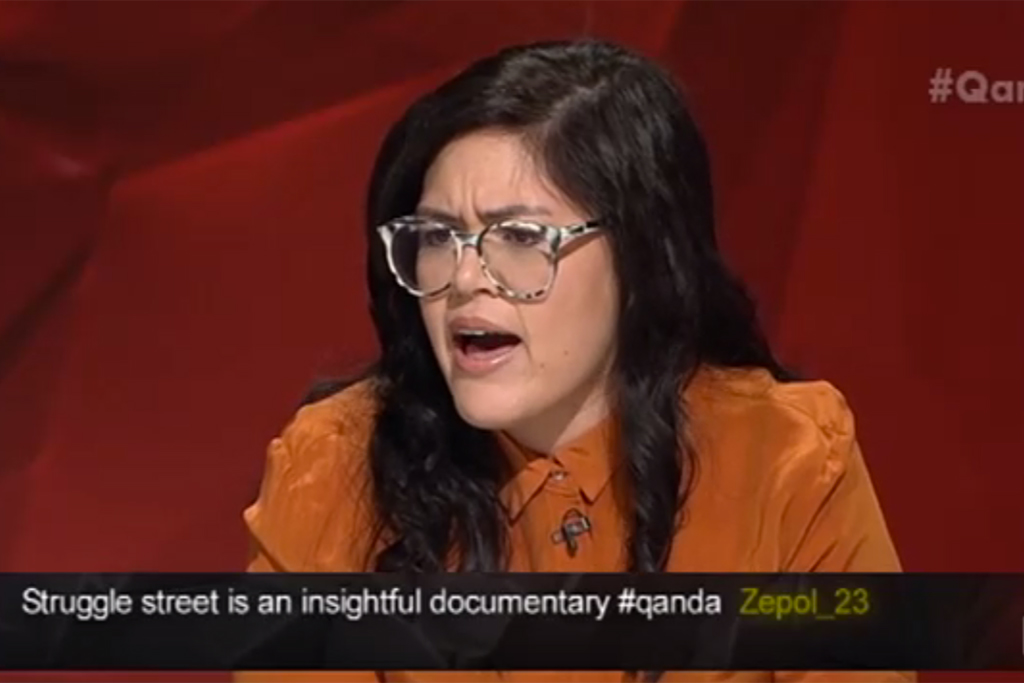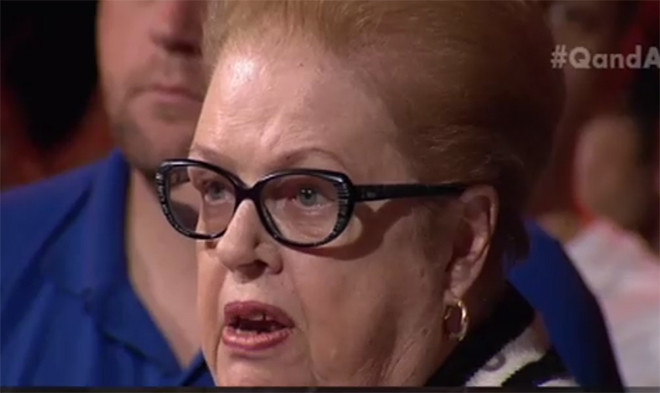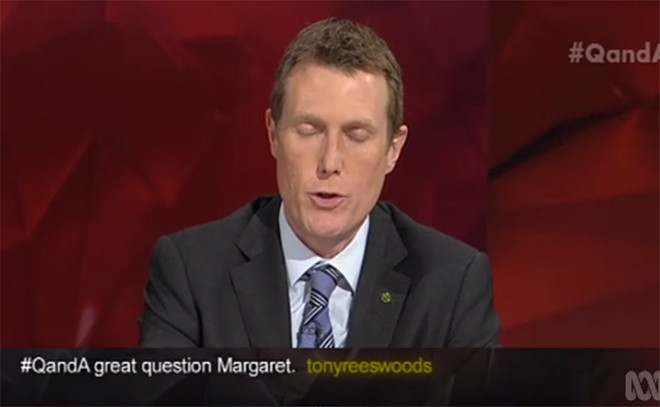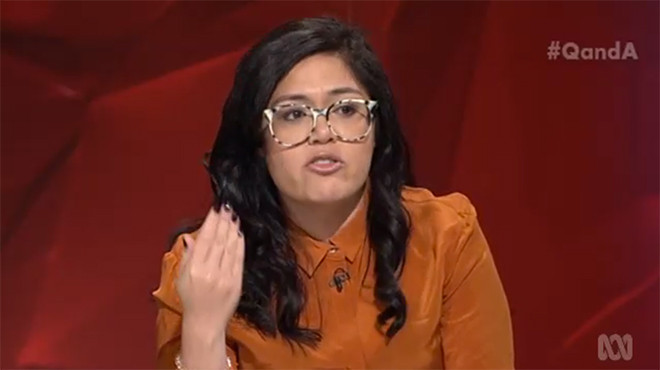Seven Useful Conversations ‘Struggle Street’ Inspired On Last Night’s #QandA
The panellists may have hated the show, but it started an unprecedented half-hour of real talk about poverty in Australia that would have never happened without it.

One day before the announcement of the federal budget, last night’s Q&A had every reason to get lost in mind-numbing economic bickering. There were ongoing questions about Joe Hockey’s effectiveness as Treasurer, the government had just announced controversial changes to childcare and paid parental leave, and the panel was stacked with political heavyweights like the PM’s Parliamentary Secretary Christian Porter, Shadow Communications Minister Jason Clare, and AFR journo Jennifer Hewitt.
Playwright writer and actor on ABC’s Black Comedy Nakkiah Lui was also there, representing #THEYOUTH, and Clive Palmer was plonked on the end giving the public a hope he’d liven things up with an odd defamatory outburst or a rogue nipple stroke. Although as I write it, I quickly realise that particular threat could have been a solid reason to avoid the show altogether.

With talk of superannuation, stay-at-home parents, and a sporadic polling of how many in the audience enjoyed last year’s budget — it was three people, awkwardly none of whom were Christian Porter — things started off as planned. But exactly halfway though the show, everything got spectacularly de-railed when someone inevitably brought up Struggle Street.
“As people living in the community, we were appalled at the elitism and disconnected privilege shown by SBS, which showed the community without an understanding of its context and without the informed consent of the participants,” said Mt Druitt high school student Johanna Larkin. “We therefore ask, is all coverage good coverage? When do our personal stories become the property of the media?”
With the last two episodes of the controversial show due to air on SBS tomorrow night, everyone on the panel was quick to condemn the first episode of the three-part documentary, and defend the angry Mount Druitt residents who were in the live audience. Christian Porter said he “hated it”. Jennifer Hewitt flatly announced, “the whole thing was a big negative”. Nakkiah Lui wrestled with the methods of the show’s creators and questioned its effectiveness now that the participants have been “mocked and vilified”.
But, as everyone continued to detail the very real problems with the pilot, they seemed to almost unwittingly flow into a detailed 30-minute discussion about the very important issues the show raises. As a pleasant surprise, what we were left with was actually a relatable and passionate talk about welfare and systemic poverty on national television the night before the federal budget.
All the people at #qanda complaining about Struggle Street…definitely wouldn't be on national TV discussing these issues without it.
— Michael Koziol (@michaelkoziol) May 11, 2015
Do all these conversations and the platform they were given actually make the show a success?
–
#1: The Government Are Not Acknowledging This Very Real Inequality
As a Mount Druitt resident herself, Nakkiah Lui acknowledged that the people she saw in the show’s first episode were incredibly familiar to her. She then argued that their lifestyle was less an indictment of the place itself, and more a symptom of the larger political climate.
“The one thing we can see about Struggle Street is that this is a community that has been let down by its government,” she said. “It’s rather ironic that we have Struggle Street showing this week, we have the budget being announced, and we have our Prime Minister coming out and saying $185,000 is roughing it. The subjects of this documentary are living on less than 10 percent of that. How disconnected is that? Do we have a government that is disconnected or is it cruel? I’m not too sure.”
Can see you've been doing it tough, @JoeHockey Must be terrible only being able to smoke 1 Cuban cigar at a time: pic.twitter.com/ofgCo2AziG
— WillowGhost (@TheWillowGhost) May 9, 2014
–
#2: It’s Not An Isolated Problem
Criticising the show’s myopic focus for stigmatising Mount Druitt, Jason Clare raised the point that the characters who were depicted could just as likely have been from other areas.
“I saw people that were dealing with mental illness, unemployment, alcohol problems and drug abuse, and I thought to myself, ‘This isn’t unique to any part of Sydney or Australia’,” he said. “You could see it if you walk out of this studio in five minutes.”
Similarly, Nakkiah Lui argued that the pilot at least should have depicted the struggles of more than one socioeconomic group.
“What did concern me was the missing representation of the working class; the fact that you can be engaged in the workforce and still be struggling, and still be caught in the poverty cycle,” she said. “There are many people working who are one step away from going into the welfare cycle or have just left it.”
–
#3: Welfare Cuts Are Making Things Worse
There were a number of people from Mount Druitt advocacy organisations in the audience who voiced grievances about the show, then used the opportunity to speak about the fact their government-funded programs had been shut down.
“I think all these socioeconomic environments need education and jobs,” said Margaret Bell from The Learning Ground. “Both sides of Parliament are always banging on about jobs and getting kids back to school, so my question is: why then is the govenrment de-funding the organsations?”
You can witness her glorious rage in full motion here:
Or, if you’d like to savour it, here’s the play-by-play:
Jason Clare then piled on and elaborated with the other important community resources the government have de-funded.
“Lots of programs have been cut, including Youth Connections, which you saw on the program,” he said. “Emergency relief has been cut as well, that’s the sort of money that if people need a $20 Woolies voucher because they can’t feed their kids or need money for blankets or nappies … $250 million’s been ripped out of that and people will suffer.”
–
#4: How Can We Turn It Around?
Not content with lofty political answers, Margaret pushed Porter for direct action on the issue. She was backed up by two welfare workers from other agencies, as well as Blacktown Mayor and vocal opponent of the documentary Stephen Bali.
“I’d like to know, as the Prime Minister’s Parliamentary Secretary, will you fight to have funding returned to the organisations that are closing the gap and getting kids back to school?” Margaret asked.
Though Porter was fairly noncommittal about the whole thing, Clive Palmer was quick to back her up. “We’ve got to have our politicians realise that the work these people are doing is fundemental to ensure that we have a successful Australia tomorrow,” he said. “That’s why your work is so important, and that’s why Christian Porter’s going to go back to Canberra to see if he can reverse that decision.”
–
#5: There Are Systemic Problems With Education
Looking at the root causes of the problems he witnessed on the show’s first episode, Jason Clare then argued that this kind of poverty will continue unless we make a stand for education in disadvantaged areas.
“One of the things you’ll find in a lot of our communities is a drop in low-skill jobs,” he said. “It’s a trend that’s been happening for a long time. It’s only going to continue; there’s going to be fewer jobs with low skills. That’s why we need more and more people to finish school.”
“We set ourselves a target of 90 percent to finish school, but funnily enough you go to some suburbs and it might be 100 percent, you go to others and it might be 50, 60, or 70 percent. That’s where disadvantage will be entrenched, unless we do something about our schools.”
–
#6: Job Agencies Are Proving Themselves To Be Ineffective
Another on-point question from the audience suggested this could have something to do with the government’s system to deal with unemployment itself.
“There is great evidence of systematic failure for Mount Druitt and I’m sure other parts of Western Sydney — one of which is these job agencies that are chosen by the government for people to go and look for jobs,” Peti Moaga said. “Most of these job agencies are just calling people in to fill in forms to satisfy requirements for Centrelink or simply just ticking the box for them. My question is: how do we help these people who are continually going into these job agencies? Will the government come up with easier and more accessible solutions?”
Unfortunately, Christian Porter didn’t deliver a revolutionary new plan, but it’s worth thinking about all the same.
–
#7: Outer Suburbs Aren’t Getting The Same Care As Rural Areas
“What we love to do in the outer suburbs is make it personal,” Nakkiah Lui said. “We think these people are on welfare because they’re lazy or because of their own inability. We don’t make it political. When you look at regional areas … we say that it’s a political issue. We put money into those communities to create an economy and create jobs, but yet when it comes to the outer suburbs of many cities — and in this case, looking at Mount Druitt — there’s no economy there.”
Then, she went for the government’s jugular.
“Christian, you just said let’s not take a show like Struggle Street and make policy decisions about it —but let’s take a discourse that’s happening about a show like Struggle Street, listen to the people who have come here today and said, ‘We need money put back into our communities because we have high unemployment, because we don’t have the resources there to get kids an education’ … I feel that our government should actually be making policy decisions based on the discourse that’s coming from these people in a community that’s shouting out for your help.”
Towards the end of the episode, many Mount Druitt residents looked visibly distressed and Mayor Stephen Bali desperately explained that his constituents weren’t after pity; they wanted solutions. With the final two episodes of Struggle Street due to air tomorrow night, many viewers are preparing to cringe through a bit of the former. But, as some of the country’s finest minds (and Clive Palmer) spend half a show acknowledging and emphatically arguing about the problem of Australian poverty, it seems the latter may eventually be on the cards as well.
–
You can watch the full episode of Q&A right now on ABC iView. Struggle Street’s final two episodes will air on SBS this Wednesday at 8.30pm.




